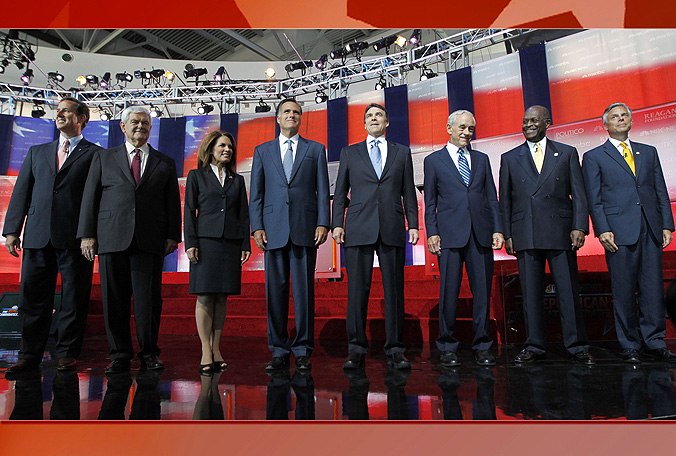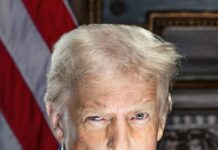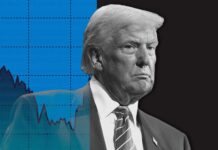Primary campaign debates have always held an important, though dysfunctional, role in the election process. They almost always provide fodder for the swathes of political analysts, myself included, that emerge from the woodwork during primary season, as party brain trusts argue the relative merits of candidates and their positions.
From a functional standpoint, they solve almost nothing. First off, as the debates are part of the primary process for a party (in this cycle, the Republican Party), they feature individuals with largely concurring viewpoints, hardly an environment for discussing real solutions that can pass a divided legislature. The debates are usually short on straight answers and specific plans for change, and often deteriorate into quixotic pandering to single-issue voters. What’s more, the debates pit eventual supporters against each other, usually on minor issues and voting records, offering general election detractors ammunition to use against the party’s eventual candidate.
So why do we as Americans eat up the primary debates with such ferocity? The debates are a litmus test for candidates’ debating skills and campaigning abilities. A candidate who looks defensive and uncomfortable under the lights often turns off voters and gives off a perceived weakness; one bad debate could break a mid-level candidate (i.e., Tim Pawlenty). On the flip side, a well-spoken candidate can win more supporters in a debate than in a thousand campaign speeches. Party members understand that the general election is, at least in part, a beauty contest, and that only a polished speaker can hope to win voters in the age of video. The debates give a strong indication of candidates’ electability, showing which individuals are ready for the big stage.
In the past week, the American electorate has witnessed, not one, but two GOP primary debates broadcast on national television. On Wednesday, September 7, the eight Republican front runners fielded questions from NBC Nightly News anchor Brian Williams and Politico editor John F. Harris at the Ronald Reagan presidential library in Simi Valley, California. Five days later, on Monday, September 12, the candidates again butted heads, this time for CNN and the National Tea Party Caucus. The debates were heavy on rhetoric, but did give a good idea of the future of this primary season. Below are reports on each of the candidates, in no particular order.
Mitt Romney
Former Governor of Massachusetts (2003-2007). Former head of private equity firm Bain Capital
Overall Diagnosis: The prospective front-runner fared well in the debates. He came to the Reagan Library noticeably defensive, particularly with the new-found popularity of primary newcomer Rick Perry, who has crept up steadily in Republican polls. He looked at ease discussing the economy, his obvious forte. The health care debate has haunted the Romney camp from the start, and he fielded six distinct questions in both debates. He effectively reiterated that he would not support universal health care as he did as governor of Massachusetts, and promised (along with his seven counterparts) to repeal Obamacare as president. He offered conciliatory remarks to his fellow candidates (with the notable exception of Mr. Perry), and displayed a sense of compassion for the elderly and uninsured, an encouraging nod to his electability.
Looking Ahead: Mitt retains his spot as front-runner in the Republican field. While Perry continues to win over voters in the polls, this is still the stormin’ Mormon’s spot to lose.
Herman Cain
Former CEO and Chairman of Godfather’s Pizza.
Overall Diagnosis: A Republican presidential primary could never be complete without one outsider businessman throwing his hat in the ring. After dominating the first two GOP debates with his pro-jobs energy, Cain came off unprepared in the NBC debate, losing ground to the more polished candidates. He regained his energetic charisma in the Tea Party debate, though, with wholesome Christian anecdotes thrown in for good measure. The former Godfather’s CEO has some ingenious tax ideas (think Huckabee in 2008), and is by far the most in touch with the American economy. Cain is one of two free-market crusaders in the primary, the other being Rep. Ron Paul.
Looking Ahead: Cain brings a refreshing realism to the race. Unfortunately, the general election is a beauty contest as much as anything, and Republicans need a polished, well-versed candidate to take on the sinuous President Obama. Herman Cain will return to the private sector next fall considerably lighter in the pocket book.
Newt Gingrich
Former representative from Georgia (1979-1999). Former Speaker of the House (1995-1999)
Overall Diagnosis: Since the end of the Bush presidency in 2008, the Republican party has lacked a seasoned standard bearer. Newt Gingrich, once the rabble rouser who never backed down from a stand-off, has resurrected himself as the elder statesman of the Republican field. He is by far the most effective communicator of the bunch, evidence of his three decades in Washington. More than once in the debates, Newt snapped at moderators for asking loaded and divisive questions, establishing the organic cohesiveness necessary to win an election. His extensive legislative experience gives Gingrich an almost jaded pragmatism that nicely balances the rampant idealism in the rest of the field.
Looking Ahead: For better or for worse, Gingrich is inseparably tied to this congress, mainly because of the similarities between the elections of 1994 and 2010. Voters will inevitably associate Newt with the intransigence of the increasingly unpopular House Republicans, dooming his campaign to failure. Hopefully, the incoming Republican president will find a place for Gingrich’s extensive knowledge in his or her cabinet.
Rick Perry
Former Lieutenant Governor of Texas (1998-2001), Governor of Texas (2001-Present)
Overall Diagnosis: A month ago, Perry stormed on to the political scene with his entrance into the Republican race. The country held its breath in both debates, as Perry finally had a chance to introduce himself to the national electorate. As much as it pains me to say it, the governor looked great in the debates. In the NBC debate, he gave on-the-ball answers to every question the moderators had to throw at him, including a particularly loaded question about his state’s death penalty record. He continued his Fed Up! persona, calling for states’ rights every chance he could. Perry caused an ongoing stir when he point-blank accused social security of being a Ponzi scheme (which it is), offering fodder for his competitors in the second debate.
Looking Ahead: Perry continues to storm ahead in the polls, with several national polls showing him ahead of Romney and Rep. Michelle Bachmann. While his good ol’ boy voice and self-confident smirk may remind voters of George W. Bush, Republicans are impressed across the board with his conservative credentials. It’s going to be a tight race between Perry and Romney; look for sparks to fly in the near future.
John Huntsman
Former Governor of Utah (2005-2009). Former Ambassador to China (2009-2011)
Overall Diagnosis: This year’s Republican primary lacks the foreign policy gurus that normally dot the primary field. Huntsman is the only candidate with real foreign affairs experience, which he flaunted to the fullest extent in the debates. Huntsman looked flustered and on the attack in the debates, much like the lackluster Tim Pawlenty looked in the debates a month ago.
Looking Ahead: Despite strong credentials, Huntsman seems to be on the back end of his presidential run. Like a sailor splashing water off a sinking ship, Huntsman tried to differentiate himself in the debates to no avail. Look for the Huntsman camp to fold in coming weeks.
Ron Paul
Representative from Texas (1976-1988, 1997-Present). Former Libertarian Party presidential candidate (1988)
Overall Diagnosis: Listening to Dr. Paul lecture on small government is a guilty pleasure to Libertarians like myself; it offers a glimpse of the paradise that is unobtrusive government. He is the only straight talker in the debate, delivering his opinions with a conviction that only earnest honesty can bring. Paul is by far the most refreshing voice in the debate, a man who fought big government before it was cool to fight big government. Like a father candidly telling his children the facts of life, Ron Paul addresses the real spending problems in government, especially defense spending, the sacred cow of the post-9/11 Republican party.
Looking Ahead: Although I love most of Dr. Paul’s idea, he has been a side show right from the start. His comments on 9/11, claiming that American interventionism causes attacks on our soil, made him always and forever an extremist. When the tax code is simplified and marijuana is finally legalized (as Paul has supported for decades), the nation will praise the forward thinking ideas of Dr. Paul. This election season, though, will once again leave Paul empty handed.
Michelle Bachmann
Representative from Minnesota (2007-Present). Chairwoman of the Tea Party Caucus (2009-Present)
Overall Diagnosis: Michelle Bachmann proved once again in last week’s debates that she’s not ready for the presidential stage. Though not the ice queen we’ve seen in recent weeks, Bachmann maintained her no-budging, compromise-is-not-an-option persona in both debates. This cavalier (and, dare I say, maverick) intransigence will no doubt help her with angrier Tea Party voters, but at the expense of a much larger electorate weary of the gridlock in Washington. Bachmann jumped on the opportunity to sling mud, first at Romney with repeated health care jabs, then at Perry for his mandated human papillomavirus (HPV) vaccine in public schools. Bachmann endlessly pandered to the fears of parents, one even claiming after the second debate that the vaccine causes mental retardation.
Looking Ahead: There is no doubting the importance of the Tea Party within Republican politics. The roots movement shifted the national political discussion towards our massive debt and fiscal austerity, no small task in this free-spending era. But Tea Party darling Michelle Bachmann should not win the nomination for presidency. Best-case scenario: by this time next year, Bachmann will be back butting heads and furthering the Republican cause in Congress. Worst-case scenario: a defeated Bachmann counterproductively runs as a third-party candidate, ensuring the president’s re-election and jeopardizing the Tea Party’s moment to shine.






